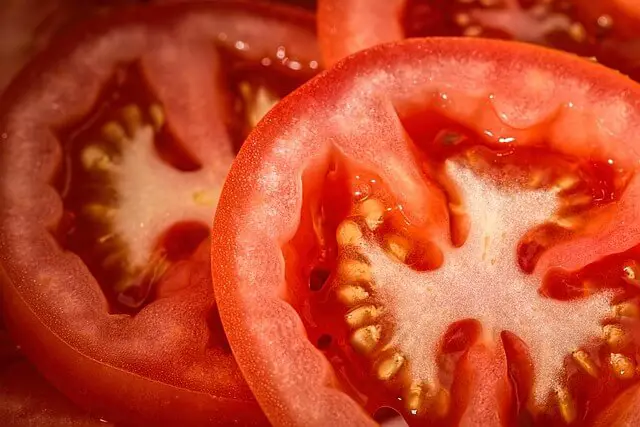The onset of the flu season in many households means a lot of sore throats, raspy voices, and snotty noses.
A sore throat can be uncomfortable, and is often caused by viruses, bacteria, or seasonal allergies.
Most usually heal within days, but inflamed tonsils and sinuses cause pain or difficulty swallowing food.
While doctors will most likely prescribe antibiotics, eating the right foods can soothe throat pain, or even speed up the recovery process.
Presently, researchers are intrigued by tomato soup as a home remedy for sore throat.
Are you struggling with flu-like symptoms such as a sore throat?
Whether you are bunged up, snotty, or congested in the sinuses, nothing does better at raising your spirits than a warm bowl of chicken or vegetable-based soups.
Studies suggest that tomato soup—besides being an all-round nourishing meal—can soothe a sore throat.
What Causes A Sore Throat?
A sore throat can be a result of infectious or non-infectious causes.
Common infectious causes include viruses or bacteria that target the respiratory tract.
Additionally, you can develop a sore throat from non-infectious causes such as gastrointestinal acid reflux, allergies, exposure to smoke, or sinus inflammation.
A sore throat is a common occurrence, especially during the flu season, and home remedies such as warm chicken or vegetable-based soups (including tomato soup, mushroom soups, and celery soup) may be enough to alleviate the discomfort.
That said, it is important to point out that sore throats such as strep throat that result from bacterial infections will require medical treatment.
For those that are induced by allergens, it is best to avoid the trigger.
Can Tomato Soup Treat A Sore Throat?

The most common and, indeed, the least cost-effective home remedy for a sore throat is gargling with warm, salty water.
However, other herbal remedies such as teas and honey can offer relief.
While the evidence is still limited on whether herbal or alternative remedies can treat a sore throat, one interesting option researchers are exploring is tomato soup.
Soups, in general, are firm favorites if you are looking to decongest, kick out a cold, or ease sinus inflammation.
Sore throats are notorious for the complications like difficulty in swallowing food and a raspy voice.
When that happens, it can be tough choosing what foods to eat or avoid because salty, acidic, or foods containing rough-textured ingredients are likely to aggravate pain.
Researchers recommend soft, hydrating, and soothing foods or drinks to ease pain or speed up recovery from a sore throat.
Why is tomato soup good for a sore throat?
What makes tomato soup an excellent remedy for a sore throat is that it is rich in antioxidants, including vitamins C, vitamins E, lycopene, and flavonoids.
Sore throats are typically prevalent during the flu season—a time when everyone can use immunity boost—and tomatoes pack plenty of antioxidants that can stimulate your immune system and neutralize the effects of oxidative stress.
But highly acidic foods aren’t a good choice for a sore throat. Tomatoes too contain vitamin C (which is acidic) and it may seem counterintuitive to drink tomato soup to treat a sore throat.
Generally speaking, tomato soup is good for a sore throat, but it is recommended that you add milk to cut down on the acidity. Otherwise, the acidity may worsen throat pains.
The Nutritional Composition of Tomatoes

Tomatoes (scientifically referred to as Solanum lycopersicum) are highly nutritious vegetables that pack plenty of minerals, vitamins, and antioxidants that offer a wide range of health benefits.
You will be surprised that before the 1800s, tomatoes were considered toxic and weren’t even consumed in the US.
Fast forward to today, they are a staple of the American diet, and understandably so because they have a rich nutritional profile.
Tomatoes may contain relatively fewer calories, but are rich in vitamin C, providing 40% of daily value (DV), vitamin A (15% OF DV), vitamin K (12% of DV), and potassium.
They are also rich in carotenoids (which gives the fruit its characteristic red pigment) and provide 80% of DV for lycopene.
| Nutritional Profile of 1 large raw tomato (180g) | Nutritional Value |
| Vitamin C | 40% of the DV |
| Vitamin K | 12% of the DV |
| Vitamin A | 8% of the DV |
| Calories | 33 |
| Carbs | 7 grams |
| Protein | 1.6 grams |
| Fiber | 2 grams |
| Potassium | 9% of the DV |
Lycopene is more bio-available when cooked, and because tomato soup is prepared using cooked tomatoes, that renders it an excellent source.
Research links eating tomatoes to a lower risk of certain cancers, as well as other chronic conditions including UV-induced skin damage, cardiovascular disease, and osteoporosis.
Thus, savoring a bowl of tomato soup may be a delicious way to make use of tomatoes’ numerous health benefits.
Other Health Benefits of Tomato Soup
Tomatoes are highly nutritious and make people healthier by reducing the risk of developing chronic conditions.
Whether raw, cooked, or processed into longer shelf-life tomato products such as sauce, paste, or ketchup, tomato soup is good for a sore throat.
Additionally, tomato soup is known to:
- Boost liver health: Tomatoes boost the liver’s detoxification function in the body. Researchers point to the large presence of chlorine and sulfur – key elements that stimulate liver activity.
- Rejuvenate: A study published in the American Journal of Clinical Nutrition indicates that tomato soup has been used as an energy drink to rejuvenate and speed up recuperation for patients on dialysis.
- Lower the risk of cardiovascular disease: Tomatoes contain lycopene – a protein that prevents hardening of arteries. Even herbalists have known since time immemorial that drinking tomato soup or tomato products lowers the risk of heart disease.
Closing Thoughts
Tomatoes are fairly rich in vitamins C and other minerals and are the most popular vegetable fruits worldwide.
They are also rich in gamma-aminobutyric acid (GABA), beta carotene, and lycopene, and a recent study published in the Journal of American Heart Association (AHA) has linked consumption of tomato soup to a lower risk of blood pressure and heart disease.
At the most basic level, tomato soup’s nutritional profile can stimulate immunity, soothe throat pains, and speed up recovery while still providing essential vitamins and minerals to the body.
References
- Messerli, F. H., Rimoldi, S. F., & Bangalore, S. (2017). Salt, tomato soup, and the hypocrisy of the American Heart Association. The American Journal of Medicine, 130(4), 392-393.
- Thies, F., Masson, L. F., Rudd, A., Vaughan, N., Tsang, C., Brittenden, J., … & Duthie, G. (2012). Effect of a tomato-rich diet on markers of cardiovascular disease risk in moderately overweight, disease-free, middle-aged adults: a randomized controlled trial. The American Journal of clinical nutrition, 95(5), 1013-1022.
- Ried, K., & Fakler, P. (2011). Protective effect of lycopene on serum cholesterol and blood pressure: Meta-analyses of intervention trials. Maturitas, 68(4), 299-310.
- Kumar, K. S., Paswan, S., & Srivastava, S. (2012). Tomato-a natural medicine and its health benefits. Journal of Pharmacognosy and Phytochemistry, 1(1), 33-43.
- Kumar, A., Kumar, V., Gull, A., & Nayik, G. A. (2020). Tomato (Solanum Lycopersicon). Antioxidants in vegetables and nuts-Properties and health benefits, 191-207.

